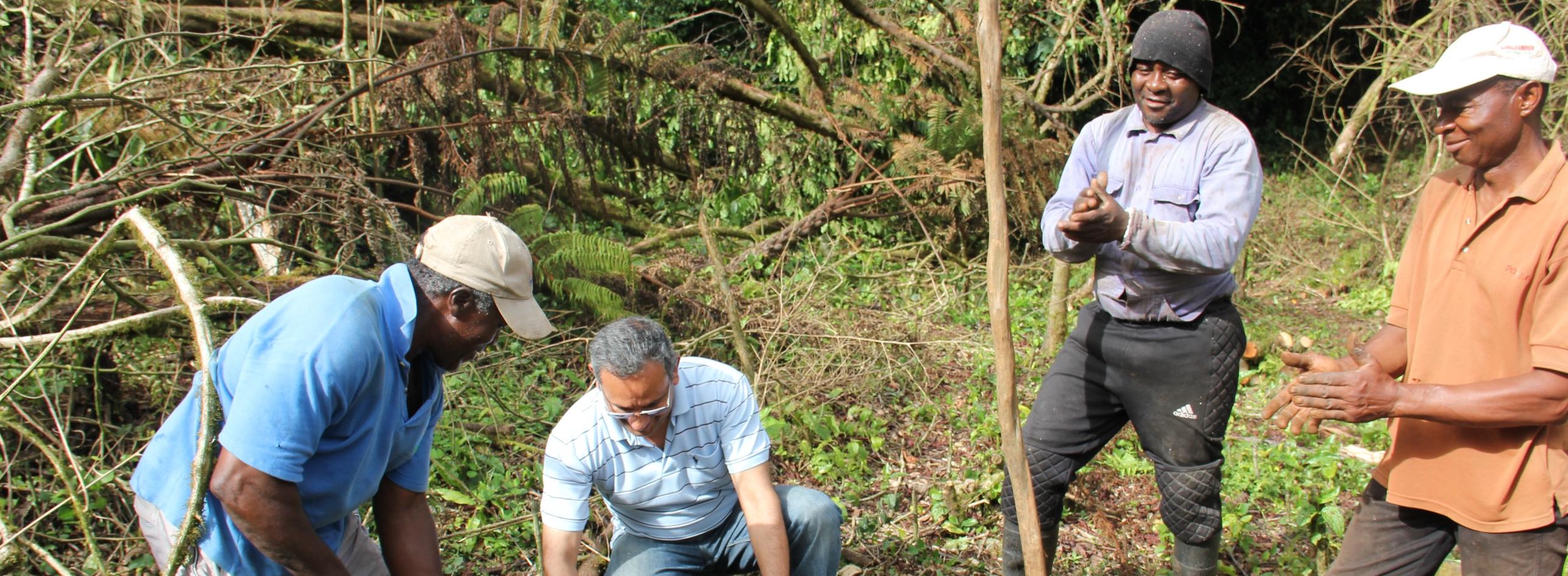
Photo:
The Republic of Equatorial Guinea is one of the smallest countries in Africa, located in the Gulf of Guinea and composed of a continental territory and five islands. The country has a tropical climate with abundant and regular rainfall, fertile soils, rich expanses of water and deep-water ports. More than 45 percent of the country’s territory is made up of tropical forests. The contribution of agricultural and fishing activities to the GDP today is close to 2 percent. Of the 230,000 cultivated hectares, 180,000 are used for growing basic foods, such as cassava, sweet potatoes, plantain, peanuts and bananas, whereas the rest of the surface is dedicated to commercial crops, such as cocoa, coffee, coconut and palm oil.
Despite the agricultural potential, national production is insufficient to satisfy the needs of the population and it is estimated that agriculture covers only 30 percent of national production, leading the country to import more than 80 percent of its food. The country is vulnerable to the impacts of climate change due to rising coastal sea levels, droughts, frequent storms, floods, rising temperatures, and extreme weather events, impacting key sectors, such as agriculture.
- National
- National Governments
- Private Sector Partners
- Food and Agriculture Organization of the United Nations (FAO)
- United Nations Development Programme (UNDP)
Equatorial Guinea is currently preparing its first National Adaptation Plan (NAP) and updated its Nationally Determined Contribution (NDC) in 2021. The NDC outlines the country’s ambitions to reduce emissions by 35 percent by 2030, with a further goal to reach a 50 percent reduction by 2050.
In 2019, FAO made a strategic contribution to the Green Climate Fund (GCF) country program, resulting in the identification of adaptation and mitigation needs and an analysis of the estimated cost of implementation. The established priorities include, among others, the promotion of good agricultural practices, resilient production systems with low GHG emissions, and the development of value chains that promote the commercialization of agricultural products.
In September 2023, the Government of the Republic of Equatorial Guinea expressed interest in receiving support from the SCALA programme, which supports countries in developing adaptive capacity and reducing GHG emissions to meet the objectives they’ve outlined in their NAP and NDC. Equatorial Guinea specifically requested support from the Programme’s Private Sector Engagement (PSE) Facility, which aims to strengthen private sector participation in adaptation initiatives.
In October of the same year, a meeting was held with the SCALA PSE global team and the focal points of the UNFCCC, the Ministry of Environment, FAO and UNDP in Equatorial Guinea to discuss the scope of the work in in line with the scope of support of the SCALA PSE Facility, so that it can strategically contribute to achieving national objectives, building on the ongoing NAP, NDC and EN-REDD+ initiatives, and provide evidence-based studies for the GCF program on agriculture climate resilient and value chain development.
Due to the rapid development of the country’s economy because of contributions from its natural oil resources, the prioritization of Equatorial Guinea’s NDC and NAP ambitions is critical.
Equatorial Guinea is to become a reference country for climate-smart agriculture in tropical areas, with proposed climate adaptation measures to guarantee food security, diversify the national economy, reduce the use of agrochemicals, limit methane and nitrous oxide emissions, and promote carbon capture. Likewise, the EN-REDD+ included several key areas within its strategic lines. It focused on the development of value chains for agricultural products and their national marketing to reduce food imports. This aims to improve food security and increase income. Additionally, it emphasizes the business and commercial development of small and medium producers and the identification of climate-smart practices.
To achieve these objectives and contribute strategically to the NAP, NDC, EN-REDD+ and the GCF, Equatorial Guinea requested assistance to carry out a detailed mapping and analysis of the ecosystem of the coconut value chain. The mapping and analysis will have a focus on identifying private sector actors, adaptation challenges, good practices, barriers to accessing climate finance, investment potential and incentives to participate in climate dialogue. It is expected that the intervention can inform climate policy and support the design of climate-resilient and gender-responsive interventions.
Scope of work
Private sector and ecosystem mapping and analysis of coconut value chain.
Activities include:
- Overview of the coconut value chain
- Private sector and ecosystem mapping
- Market and climate change risk analysis
- Validation workshop
